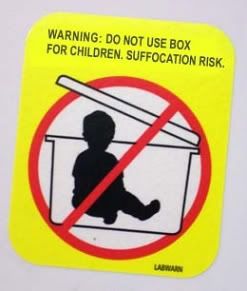The virtues of labels and labelling
Technorati tags: Humor, Rebuttal, Labels, Religion, Hamburgers
 Labels and labelling are generally good things. And we all indulge in labelling, from time to time.
Labels and labelling are generally good things. And we all indulge in labelling, from time to time.
Labels help differentiate, for instance, a bottle of white vinegar and a bottle of kerosene, failing which you might read a newspaper headline like "Sweet and Sour Chicken Dish Spontaneously Combusts". Or something awesomely fiery like that.
For the colorblind, labelling helps a person choose between crossing an intersection safely and getting mowed down by oncoming traffic, by observing the WALK and DON'T WALK labels, rather than relying on the lights alone. This, of course, assumes that the crosswalk is not somewhere in Malaysia.
Labels are also frequently used to characterize people, by their perceived behavior or personality. You may label somebody stupid, for instance, because that someone got mowed down by oncoming traffic despite knowing that the light displayed DON'T WALK. But this sort of labelling, of course, requires a certain amount of conjecture, because the someone could have been colorblind and illiterate, and you simply assumed he or she was stupid.
And so when Walski gets labelled as heretic, lunatic or infidel, as some self-righteous folk do from time-to-time, it doesn't bother him much, because after they are just labels, and the person(s) who labelled Walski as such, don't know Walski, and are therefore just acting in a manner, best described as dumb. The person(s) may, or may not, actually be dumb, it's merely that they behave that way. Besides, Walski doesn't know these idiots personally, so who cares, really.
(more manic labelling in the full post)
Labels, in addition, are relative. For instance, an idiot with the IQ of 69 may consider someone the IQ of 75 a genius, whereas the standard IQ chart would label both of these individuals as "a few fries short of a Happy Meal" (okay, the actual terminologies are Defective and Borderline, respectively, on the Wechsler scale) .
In fact, the way we perceive the world around us is relative. Like the way we perceive good or evil. Mawi, to some, maybe the best thing to hit the Malaysian entertainment scene since karaoke. To Walski, Mawi is evil - albeit from a music perspective. Evil in the true sense would be Barney; Mawi is simply irritating.
What's also irritating is how certain people choose to label those that don't agree with their views as evil, or hypocritical, or deviant. Just because they think their views are the only valid ones. This happens a lot when it comes to religion.
As an example, take the case of a certain individual named Abdullah from Penang, replying to an earlier post on this blog. To Abdullah, the conservative Islamic view is the only valid view. Anyone with differing viewpoints, to Abdullah, would be considered anti-Islam, a heretic, a hypocrite, etc. - to enter into a discourse with these sorts of infidels would just be too much a stretch of his logical capacity, and therefore not worth the effort.
This would be analogous to saying any hamburger, other than from McDonalds, is an abomination and an insult to hamburger eaters everywhere. Walski prefers the ones from Burger King, by the way. That must make Walski the worst burger heretic on planet earth, using Abdullah from Penang's logic.
And what's most irritating about this is that while Burger King makes excellent burgers, their french fries are pretty raunchy. The ones from McDonalds are a lot better. Which only goes to prove that both hamburger joints complement each other, and both have a right to exist. And add to the problem of junk food prevalence - but that's an entirely different story.
But back to Abdullah from Penang. To him, labels are important because otherwise he might just accidentally douse his salad with kerosene. And labels also help him identify with those who think like he does, and those that don't. The last thing Abdullah would want, probably, is to accidentally engage himself in a discourse with a burger heretic.
Labels and labelling have been with mankind, in some shape or form, since even before the invention of canned foods, and Walski expects that their use will continue for many, many years to come. Without labels, life would simply be too mundane.
So, feel free to label Walski however you see fit - you're entitled to make your life as exciting as you want it to be. And labels help.
















